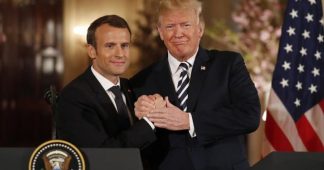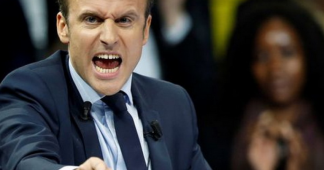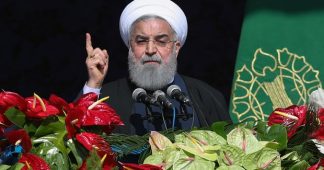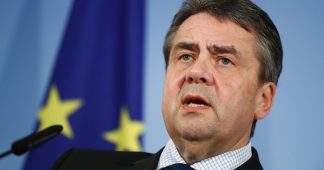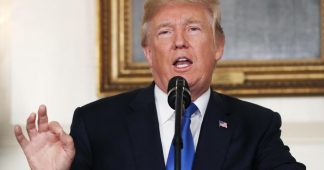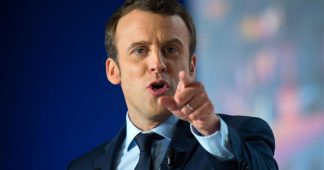By Alex Lantier
25 April 2018
On Tuesday, on the second day of his three-day state visit to Washington, French President Emmanuel Macron held a joint press conference with US President Donald Trump to discuss the content of their talks on the Middle East and global trade. At the press briefing, Macron sought to adapt to Trump’s threats to scrap the 2015 Iranian nuclear treaty and pledged France’s continued support for US wars in the Middle East.
Paris is joining Washington in telling Iran it must comply with US dictates in the Middle East or face the renewal of trade sanctions that were in place before the signing of the treaty and the possibility of military attack. Despite the debacle of the seven-year NATO proxy war for regime change in Syria, the US and France, the former colonial overlord of Syria, cannot accept any strengthening of the position of Iran, the Syrian regime’s key backer alongside Russia. Instead, barely 10 days after the US-UK-French missile strike on Syria, they are paving the way for a renewed military confrontation with Syria, Iran and nuclear-armed Russia.
The move was a significant shift by Macron, who has publicly supported the Iranian nuclear deal and, in an interview with Fox News prior to his visit, claimed there was no “plan B” to replace it. This position received statements of support from governments around the world. Russian Foreign Minister Sergei Lavrov, on a visit to Beijing, said that he and his Chinese counterparts would oppose any attempt to scrap the deal.
Key US allies also opposed terminating the agreement. British Foreign Secretary Boris Johnson stressed his “strong view” in favor of the treaty, and German Foreign Minister Heiko Maas warned that ditching the Iranian nuclear treaty would have dangerous consequences for the military situation in the Middle East. “We believe it is extremely important to uphold this agreement,” he declared. “Were it to fail or the US to drop out, we would not have anything comparable to it and we fear that the situation would significantly deteriorate, with everything that goes with it.”
Iranian Foreign Minister Javad Zarif warned that while he would scrupulously respect the existing treaty, Iran would “shred” it if Washington pulled out. “It is either all or nothing. European leaders should encourage Trump not just to stay in the nuclear deal, but more important, to begin implementing his part of the bargain in good faith,” he wrote on Twitter.
Tuesday morning, when Macron restated his support for the treaty at a photo-op before his private talks with Trump, the US president exploded, indicating this position was unacceptable.
Macron declared, “What I just said is that the Iran deal is an important issue. We’ll discuss that. But we have to take it as a part of the broader picture, which is security in the overall region. And we have the Syrian situation, we have an upcoming election in Iraq, and we have the stability to preserve for our allies in region. And what we want to do is to contain the Iranian presence in the region, and [the Iranian nuclear deal] is part of this broader picture.”
Trump responded: “It just seems that, no matter where you go, especially in the Middle East, Iran is behind it, wherever there’s trouble: Yemen, Syria. No matter where you have it, Iran is behind it. And now, unfortunately, Russia is getting more and more involved. But Iran seems to be behind everything where there’s a problem… And the Iran deal is a disaster. They’re testing missiles. And what is that all about? You look at the ballistic missiles that they’re going and testing, what kind of a deal is it where you’re allowed to test missiles all over the place?”
After Trump and Macron emerged from their private talks, however, the French president appeared to have aligned himself with Trump’s positions.
Trump began by hailing the unprovoked April 14 US-UK-French missile strikes on Syria based on fraudulent and unsubstantiated claims that the Syrian regime had used chemical weapons: “President Macron, I thank you for your leadership in this effort,” he said. “The United States and France are also cooperating to prevent the proliferation of nuclear weapons. We are grateful for France’s key partnership in our campaign of maximum pressure on the North Korean regime.”
Trump also applauded Macron’s crackdown on immigrants in France, calling it a battle against “uncontrolled migration,” and adding, “Mr. President, I admire the leadership you have shown in addressing this in a very honest and direct fashion, and not always popular.”
Macron then suggested that he was prepared to accept Trump’s opposition to the Iranian nuclear deal: “I can say that we’ve had very a frank discussion on that, just the two of us. You consider that the Iranian deal, the JCPOA (Joint Comprehensive Plan of Action), the one negotiated in 2015 with Iran—is a bad deal… We therefore wish, from now on, to work on a new deal with Iran.”
He laid out what he claimed a new treaty with Iran would have to address: “What we need… is to cover four topics. The first one is to block any nuclear activity by Iran until 2025. This is feasible thanks to the JCPOA. The second is to make sure that, in the long run, there is no nuclear Iranian activity. The third fundamental topic is to be able to put an end to the ballistic activities of Iran in the region. And the fourth one is to generate the conditions for a solution—a political solution to contain Iran in the region—in Yemen, in Syria, in Iraq and in Lebanon.”
The position outlined by Macron constitutes a reckless threat against Iran that risks provoking a violent clash between it and the NATO powers. It amounts to an ultimatum to Iran that, despite the victory of its forces fighting alongside pro-regime forces on the ground in Syria, it must completely surrender to US and European terms. The Iranian regime has previously stated that it will oppose limits on its ballistic missile program.
The US and French presidents, shaken by their defeat in Syria, are indicating that they will stop at nothing to crush opposition to US-led imperialist hegemony in the Middle East. After a quarter-century of war in the Middle East since the Stalinist dissolution of the Soviet Union eliminated the main counterweight to US military action, millions have been killed or displaced in wars from Iraq and Afghanistan to Libya, Syria and Yemen. Yet what is being prepared is an even greater escalation, as the NATO powers threaten Iran and, implicitly, its ally Russia.
Asked by Agence France-Presse why he suddenly changed his position on the Iranian nuclear treaty after telling Fox News that he had no “Plan B” ready if the treaty was scrapped, Macron brazenly denied that he had used the term “Plan B” in relation to the Iranian nuclear treaty. “I usually refer to the fact that there is no Plan B planet,” he said. “It was about climate rather than Iran.” He then went on to insist that the final decision on the Iranian nuclear treaty rested with Washington.
“’Now, regarding Iran,” he declared, “I’ve always been coherent, and you can go back to what I said at the UN General Assembly in September. I always said that there was the JCPOA, but we needed to add three pillars post-2025—including the ballistic issue and regional influence. I do not know what President Trump will decide regarding the JCPOA and it is his responsibility.”
